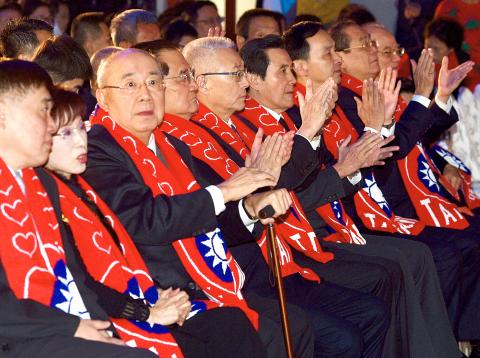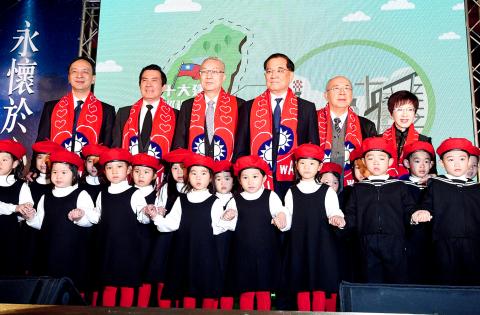Chinese Nationalist Party (KMT) Chairman Wu Den-yih (吳敦義) yesterday vowed to restore the nation to its former glory under late president Chiang Ching-kuo (蔣經國) by leading the KMT to victory in the local elections in November and to win back executive power in 2020.
Wu made the remarks at an event held by the KMT at the Taipei Hero House to commemorate the 30th anniversary of Chiang’s death.
The event was attended by all KMT chairpersons after former president Lee Teng-hui (李登輝) — former president Ma Ying-jeou (馬英九), former vice president Lien Chan (連戰), New Taipei Mayor Eric Chu (朱立倫), Wu and Hung Hsiu-chu (洪秀柱).

Photo: Peter Lo, Taipei Times
“Chiang was a man with eyes like torches, a heart as big as the ocean and shoulders stronger than iron,” Wu said during his speech about his experience working under Chiang.
Chiang’s four major contributions to the nation were pushing the 10 Reforms (十項革新), the 10 Major Construction Projects, lifting martial law and allowing veterans who had retreated from China to Taiwan with the KMT in 1949 to visit their families in China.
While carrying out the 10 Reforms Chiang led by example, adopting a frugal lifestyle, while he also punished officials found to have been involved in graft, which greatly reduced corruption in the government, Wu said.

Photo: Peter Lo, Taipei Times
The 10 Major Construction Projects jump-started the nation’s industries and propelled the nation to the No. 1 spot among the four “Asian tigers” in terms of economic growth, he said.
The lifting of martial law enabled people to form political parties and laid the foundation for the nation’s transformation to a free and democratic nation built upon the rule of law, while allowing veterans to visit their families in China ushered in an era of peaceful exchanges across the Taiwan Strait, he said.
“As we commemorate the 30th anniversary of Sir Chiang’s passing, we feel that the responsibility on our shoulders is more important than ever, and the fire in our hearts is burning more fiercely than ever,” Wu said.
The KMT is more steadfast than ever in its resolve to regain political power — especially when it is faced with a ruling party that deviates from the ways of the past — so that it can bring back prosperity and wealth to all people; promote harmony in the legislature; build a society where young people’s talents can be seen and where elders are treated with respect; and resume steady and peaceful cross-strait developments through the bond between Zhonghua minzu (中華民族, “Chinese ethnic group”) on both sides of the Taiwan Strait, Wu said.
The party will nominate whoever has the necessary capabilities, loyalty, experience, achievements and chance of winning in the lead-up to this year’s local elections, and the 2020 presidential and legislative elections, he said.
Ma reminisced about his 76 months working as Chiang’s aide, sharing anecdotes and doing impersonations of the former president, with which he drew laughter and applause from the audience.
“When he received then-Washington Post publisher Katharine Graham, and told her that he was going to lift martial law and allow people to found political parties, I translated his every word into English, while telling myself that he was creating history,” Ma said.
He lauded Chiang for bringing about peaceful cross-strait developments and criticized the Democratic Progressive Party for allowing cross-strait exchanges to cease.
“When did cross-strait relations become as icy as they were before I took office?” Ma said.
While Chiang ended the nation’s authoritarian era and laid the groundwork for Taiwan’s democracy, a new authoritarian regime has formed, waiting for its moment, Ma said, without clarifying his remarks.
“We should all be alert and not allow the hard-fought democratic and constitutional system to be destroyed,” he said.

An essay competition jointly organized by a local writing society and a publisher affiliated with the Chinese Communist Party (CCP) might have contravened the Act Governing Relations Between the People of the Taiwan Area and the Mainland Area (臺灣地區與大陸地區人民關係條例), the Mainland Affairs Council (MAC) said on Thursday. “In this case, the partner organization is clearly an agency under the CCP’s Fujian Provincial Committee,” MAC Deputy Minister and spokesperson Liang Wen-chieh (梁文傑) said at a news briefing in Taipei. “It also involves bringing Taiwanese students to China with all-expenses-paid arrangements to attend award ceremonies and camps,” Liang said. Those two “characteristics” are typically sufficient

A magnitude 5.9 earthquake that struck about 33km off the coast of Hualien City was the "main shock" in a series of quakes in the area, with aftershocks expected over the next three days, the Central Weather Administration (CWA) said yesterday. Prior to the magnitude 5.9 quake shaking most of Taiwan at 6:53pm yesterday, six other earthquakes stronger than a magnitude of 4, starting with a magnitude 5.5 quake at 6:09pm, occurred in the area. CWA Seismological Center Director Wu Chien-fu (吳健富) confirmed that the quakes were all part of the same series and that the magnitude 5.5 temblor was

The brilliant blue waters, thick foliage and bucolic atmosphere on this seemingly idyllic archipelago deep in the Pacific Ocean belie the key role it now plays in a titanic geopolitical struggle. Palau is again on the front line as China, and the US and its allies prepare their forces in an intensifying contest for control over the Asia-Pacific region. The democratic nation of just 17,000 people hosts US-controlled airstrips and soon-to-be-completed radar installations that the US military describes as “critical” to monitoring vast swathes of water and airspace. It is also a key piece of the second island chain, a string of

The Central Weather Administration has issued a heat alert for southeastern Taiwan, warning of temperatures as high as 36°C today, while alerting some coastal areas of strong winds later in the day. Kaohsiung’s Neimen District (內門) and Pingtung County’s Neipu Township (內埔) are under an orange heat alert, which warns of temperatures as high as 36°C for three consecutive days, the CWA said, citing southwest winds. The heat would also extend to Tainan’s Nansi (楠西) and Yujing (玉井) districts, as well as Pingtung’s Gaoshu (高樹), Yanpu (鹽埔) and Majia (瑪家) townships, it said, forecasting highs of up to 36°C in those areas